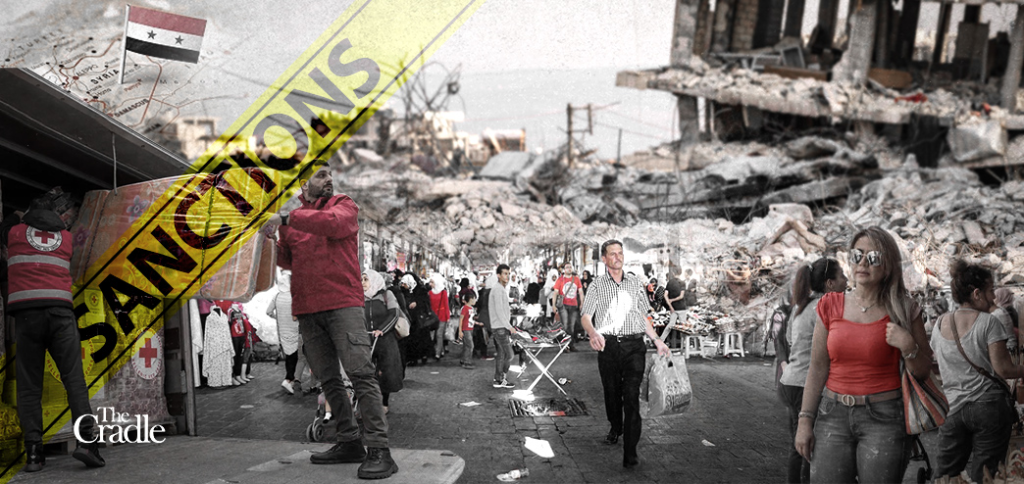The temporary lifting of Washington’s sanctions on earthquake-stricken and war-torn Syria is ‘misleading’ at best, and stands in the way of relief efforts.
By The Cradle’s Syria Correspondent
The Cradle’s Syria Correspondent
Four days after the devastating earthquake that struck southern Turkiye and northern Syria on 6 February, the US announced it would temporarily ease its Syrian sanctions in an effort to speed up aid deliveries to the country.
Specifically, the Treasury’s Office of Foreign Assets Control (OFAC) issued Syria General License (GL) 23, which allows a 180-day Syrian sanctions exemption for “all transactions related to earthquake relief efforts.” The EU followed suit later by also freezing some of its sanctions on Damascus.
But do these measures really represent a comprehensive freeze on sanctions against Syria? And are these partial suspensions proportional to the scale of the disaster that leveled the Syrian north?
A more detailed examination of these US “sanction exemptions” reveals that this humanitarian gesture was little more than a public relations stunt to placate growing Arab and Global South displeasure with Washington’s efforts to starve out Syria – sentiments that spiked quite notably after the earthquake.
The US sanctions suspension, for all practical purposes, is limited to the sending of emergency funds from “acceptable” sources. Washington, after all, still controls the process entirely – sanctions can be imposed on remittance senders at any time.
Furthermore, US sanction exemptions have not reduced the reluctance of foreign institutions and individuals to participate in Syria’s economy – even in sectors that are not explicitly targeted by the US and EU. The UN calls this unfortunate byproduct of western sanctions regimes “excessive compliance with sanctions,” because of the fear of running afoul of western financial regulators.
Suffocating sanctions
Damascus has been targeted by US sanctions since 1979 for siding with Tehran in the Iran-Iraq war (1980-1988). With the outbreak of the war in Syria in 2011, US President Barack Obama expanded previously imposed sanctions under the Syria Accountability Act (2004) as part of a western effort to create political, economic, and military pressures on the Syrian government.
These new sanctions covered practically all sectors, imposing financial restrictions on individuals, entities, facilities, institutions, ministries, the medical sector, and state banks. They were pervasive and punished all Syrians: banning passenger flights, restricting oil exports (the US, through its Kurdish proxy, the Syrian Democratic Forces (SDF), controls the oil fields in northeastern Syria), preventing the export or re-export of US goods to Syria, preventing the export of Syrian products overseas, freezing Syrian assets abroad, and severing diplomatic relations with Damascus.
This sanctions overload reached a climax with the ominous Caesar Act (2019) and Captagon Act (2022). The former granted Washington the power to impose sanctions against any individual or entity, regardless of their nationality, who engages with Syria in infrastructure and energy projects, provides financial, material, or technological support to the Syrian government, or provides the Syrian military forces with goods or services.
In 2022, the US Congress passed the Captagon Act, which targeted Syria’s pharmaceutical industry, one of the country’s most successful commercial sectors, which provides more than 90 percent of Syria’s medicine needs. This US domestic legislation grants itself the authority to monitor Syrian borders, and seeks to “legitimize” its military forces’ illegal presence in Syria.
License to chill
On 10 February, the administration of President Joe Biden issued Syria General License (GL) 23, which temporarily eases sanctions on Syria and allows for the additional flow of much needed humanitarian aid into the country. However, the statement issued alongside the decision indicates that this “exemption” has many limitations.
While removing sanctions entirely requires US congressional approval, suspending the ban on certain financial transactions with Syria for a short duration is the prerogative of the American president, and is often used as leverage to gain political concessions from US-sanctioned states.
An example of this is the 2015 nuclear negotiations with Tehran, when Obama issued licenses to freeze some US sanctions on Iran before his successor, Donald Trump, withdrew from the agreement in 2018 and reactivated the sanctions.
A press release issued by OFAC stated that GL 23 “provides the broad authorization necessary to support immediate disaster relief efforts in Syria.” It added that “U.S. and intermediary financial institutions should have what they need in GL23 to immediately process all earthquake relief transactions.”
The GL 23 “authorized all transactions related to earthquake relief efforts in Syria that would be otherwise prohibited by the Syrian Sanctions Regulations (SySR).” Importantly, it also states that “US financial institutions and US registered money transmitters may rely on the originator of a funds transfer with regard to compliance with this general license, provided that the financial institution does not know or have reason to know that the funds transfer is not in compliance with this general license.”
This language ensures that Washington retains the authority to investigate any transfers and punish money senders at any later date, on charges that the transfers are not related to relief efforts.
Another caveat, as per OFAC’s press release: “The Department of the Treasury will continue to monitor the situation in Syria and engage with key humanitarian and disaster assistance stakeholders, including NGOs, IOs, and key partners and allies.”
This essentially excludes dealings with Syrian government institutions, and prevents money transfers directly to state entities, including the Central Bank of Syria. Keep in mind that the distribution of all international humanitarian aid is directed via the Syrian government, as per the regulations and laws of the state.
This US “sanctions relief” caveat elicited a high-pitched response from the Syrian Foreign Ministry, in which it described Washington’s offering as “misleading, and aims to give a false humanitarian impression.”
Last May, the US lifted sanctions on foreign investments in areas outside of Syrian government control. The Treasury Department issued an authorization that now allows for “activities” in 12 different economic sectors in parts of northeast and northwest Syria without fear of US sanctions. This move was aimed at stimulating economic growth in areas controlled by US-backed Kurdish militias and Turkish-backed militants.
Hindering relief efforts
Washington’s sanctions have had direct consequences on international relief efforts following the earthquake. The United Nations and relief organizations were delayed in providing urgent life-or-death assistance to Syria, which the UN blamed on road and infrastructure obstacles and a “lack of fuel” – an implicit reference to the western sanctions that have deprived the country of its critical oil wealth.
Syria’s entire health sector has suffered directly from US sanctions because of power outages and the inability to purchase vital medical equipment needed to treat patients. According to estimates by the World Health Organization (WHO), around 20 medical facilities were damaged by the earthquake and need rehabilitation, but US sanctions prevent the restoration of these facilities, either through a direct ban or because foreign medical companies fear sanctions repercussions for dealing with the Syrian Ministry of Health.
Sanctions have doubled the suffering of Syrian earthquake survivors in terms of securing urgent relief materials and rehabilitating their damaged housing units. As such, UN Secretary-General Antonio Guterres has called for the lifting of sanctions that impede relief efforts.
“This is a moment in which everybody has to make very clear that no sanctions of any kind interfere with relief to the population of Syria in the present moment,” he said.
A Syrian relief source, who asked not to be named, informs The Cradle that the response of international organizations to the Syrian disaster still remains below standard due to poor funding and the difficulty of sending relief and medical materials because of the sanctions.
He explains that the impact of the US exemption license is almost negligible, as “the disaster will have a very long term impact. In normal circumstances, we need years of work, let alone the [additional burden of] sanctions.”
US ignores global calls to lift sanctions
In her preliminary report after a 12-day visit to Syria in November 2022, UN Special Rapporteur on Unilateral Coercive Measures and Human Rights Alina Dohan presented detailed information about the catastrophic effects of unilateral sanctions on Syrian citizens and the decline in their living standards.
Douhan called for the western sanctions imposed on Syria to be lifted immediately and stressed that they are illegal under international law.
The goal of US sanctions is to continue the wholesale destruction of a regional adversary that it wasn’t able to achieve during a decade-long, brutal war. Millions of Syrians were killed, injured, and displaced in a conflict funded and armed by external parties.
The February earthquakes just exacerbated the suffering that Syrians have endured for years, with official Syrian statistics claiming around half a million people affected, in addition to the damage of tens of thousands of housing units.
In a preliminary report, the World Bank estimates the direct damages of the earthquake in Syria at $5.1 billion. The destruction has affected four of Syria’s 14 governorates, which are home to approximately 10 million of the country’s population. These include Aleppo, Hama, and Latakia, which are under the control of the Syrian government, and Idlib, which is under the control of Al-Qaeda-affiliate Hayat Tahrir al-Sham. Aleppo, with a population of 4.2 million people, was the most affected ($2.3 billion), followed by Idlib ($1.9 billion) and Latakia ($549 million).
Despite exemptions for humanitarian aid, the impact of US sanctions on Syria has been significant, hindering the ability of humanitarian organizations to operate effectively in the country. The negative impact of these sanctions undermines any claims by Washington to support the Syrian people, especially in light of the ongoing humanitarian crisis.
The views expressed in this article do not necessarily reflect those of The Cradle.
Filed under: Al Qaeda, EU, Europe, Iran, kurds | Tagged: Biden’s Foreign Policy, Captagon Shipments, Hayat Tahrir al-Sham (Nusra Front), Lifting US sanction, Obama, SDF, The Syrian Earthquake, US’ Caesar Sanctions Act on Syrian |
Related posts:
Views: 0
 RSS Feed
RSS Feed

















 March 15th, 2023
March 15th, 2023  Awake Goy
Awake Goy 

 Posted in
Posted in  Tags:
Tags: 
















